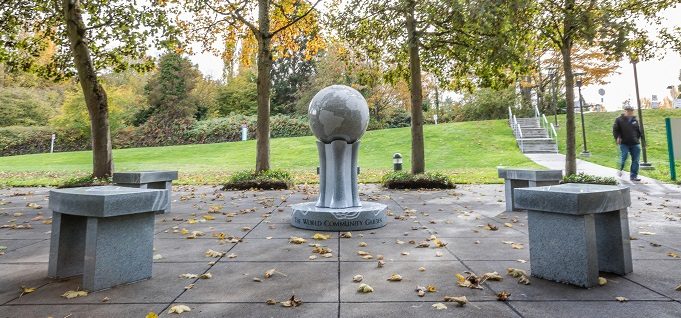Colleges cope with unexpected crises
By Ellie Ashford
March 29, 2017
Two community college presidents reflect on dealing with crisis and tragedy in their communities.
In Seattle, the international students had just arrived at North Seattle College (NSC) in September 2015 and were preparing for their first day of class. They were on a voluntary city tour when their chartered bus was hit by a “Ride the Ducks” amphibious tour bus.
Those who died ranged from one student who just turned 18 to a mother in her 50s, and they came from Korea, Japan, China, Austria and Indonesia, which added a layer of complexity to the tragedy. The students had planned to be in Seattle for a whole year and were studying a variety of subjects.
Accident victims were transported to 10 hospitals. More than 30 students on the bus were injured, some severely. The college’s immediate response was to locate and identify the students, which wasn’t that easy because they were adults and were thus protected by medical privacy rules.
The accident highlighted “the dual nature of a college president,” said NSC President Warren Brown. “You have to be emotionally present and also have to serve as the legal representative of the college.”
The Ducks bus was later found to have been at fault, but Brown still has to give numerous depositions. The college also had to get involved in U.S. Department of State and foreign embassy procedures to notify families and repatriate bodies.
In some cases, the embassies were supposed to contact family members but refused to do so, Brown says. They felt it was more appropriate for the highest-level person involved to do that, such as the governor or college president.
Helping the injured
The next steps for NSC involved helping the injured students navigate the health insurance process. The Seattle Colleges require international students to buy health insurance when they enroll or show that they already have adequate coverage.
NSC was working with insurance companies not used to mass casualties, so that was challenging, Brown says. From this experience, he learned that it’s important to work with insurance companies specializing in the student market that have employees who speak multiple languages.
Several of the injured had long hospital stays but still wanted to continue their education. One of the most touching moments for Brown was seeing a student whose legs were crushed in the accident with textbooks on the nightstand in his hospital room.
If international students want to stay in the U.S., they must attend class – and many of the accident victims did want to continue with their schoolwork – so NSC sent teachers to them and their classmates brought them textbooks.
Just about everyone on campus was affected by the accident, so NSC made sure faculty and employees, as well as students, had access to counseling.
One organization brought therapy dogs to walk around the campus to help people through the grief process.
Eventually, the college installed a monument on campus, consisting of a globe and five chairs representing the deceased – as a place for healing.
Water crisis
At the height of the Flint water crisis in Michigan, many students and employees of Mott Community College (MCC) had to travel across the city on buses and wait in long lines at emergency water stations to pick up bottled water and filters, says MCC President Beverly Walker-Griffea.
And that meant they had difficulty getting to class on time. So MCC set up 65 hydration stations on campus with highly filtered, drinkable water.
MCC added a section to its website on water resources, giving the location of hydration stations and information on testing results, how to install filters, the health impacts of unsafe water, and community resources.
The college also had to switch out of its water system and put in filters for the on-campus bistro and restaurant. College employees had to be reassigned to manage the hydration stations and learn how to test water.
All that cost MCC about $500,000, which meant the college had to defer spending for other things, such as capital projects. Walker-Griffea, however, is grateful to the many community colleges around the state and nation that donated bottled water and filters, and for the foundations that supported community programs in Flint.
Listen and serve
Walker-Griffea advises presidents who face an unexpected crisis to listen to community members.
“Understand your role in that community. For me, it was knowing that Mott was a safe haven and that we were responsive and ahead of everything that was happening,” she says. And that means “people have to have expectations of honesty.”
“A leader has to remain calm and patient in weathering the storm,” she says. “And you need to realize that at some point, morning will come, and things will be okay. Meanwhile, you have to remain a leader and use your head.”
Presidents Walker-Griffea of Mott and Brown of NSC will discuss their experiences further at a session during the AACC Annual Convention in New Orleans April 22-25.
There’s more to this story. Read the full article in CC Daily.


